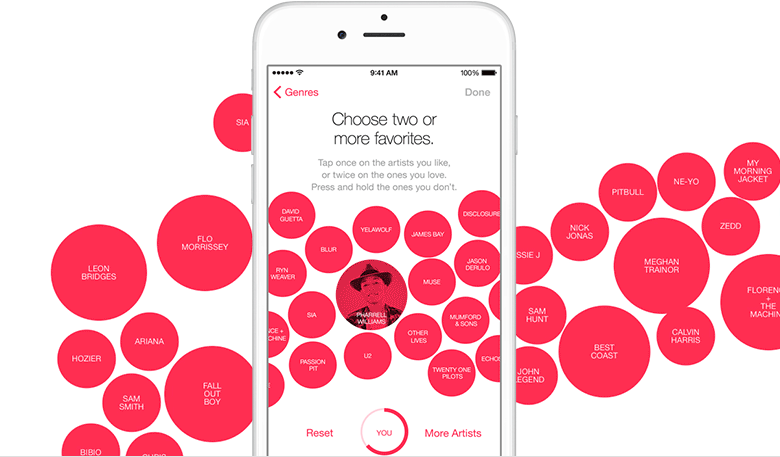 I was particularly taken with the Webster's discussion of the genre choice (p. 29) and how the audience can easier define what it doesn't like by genre than by what it does like. In so many new media networks, I feel like we are given genre tests after signing up to decide what types of content we are presented with. For example, Netflix gives us movie/TV genres and then starts to curate recommendations based on those choices. Apple Music, a newer service, presents the user with genres and artists and asks to choose what the user likes and doesn't like. In both, a dynamic choice of genre then begins to curate content. However, if Webster argues that genre choice is only best for dislikes, it seems this method may be less effective in defining what content to show a user. Both Netflix and Apple Music appear to approach a solution by also including other categories like specific artists and movie titles. Netflix once offered a million dollar prize in a contest to develop a better way of making recommendations. Lee's literature review indicated this may be a harder task than it appears due to how frequently our preferences vary, based on information, entertainment, opinion and social motivations.
I was particularly taken with the Webster's discussion of the genre choice (p. 29) and how the audience can easier define what it doesn't like by genre than by what it does like. In so many new media networks, I feel like we are given genre tests after signing up to decide what types of content we are presented with. For example, Netflix gives us movie/TV genres and then starts to curate recommendations based on those choices. Apple Music, a newer service, presents the user with genres and artists and asks to choose what the user likes and doesn't like. In both, a dynamic choice of genre then begins to curate content. However, if Webster argues that genre choice is only best for dislikes, it seems this method may be less effective in defining what content to show a user. Both Netflix and Apple Music appear to approach a solution by also including other categories like specific artists and movie titles. Netflix once offered a million dollar prize in a contest to develop a better way of making recommendations. Lee's literature review indicated this may be a harder task than it appears due to how frequently our preferences vary, based on information, entertainment, opinion and social motivations.Another aspect of the readings that jumped out was the idea of opinion leaders/elite influentials and how they translate to new media. The statistic Webster provided stated that opinion leaders represent just .05% of total Twitter users but command 50% of attention (p. 41). In making a piece of information go viral, it appeared that one goal is to catch the eye of an opinion leader in hopes of capturing that 50% attention of other users. In addition, I noted how much the first law of geography ("everything is related to everything else but near things are more related than distant things (p. 46)) still applies even when we have access to the entire world online. The quote from Mark Zuckerberg was especially interesting, as one would think Facebook would be where you could really see what is going on in the world, but "A squirrel dying in front of your house may be more relevant to your interests right now than people dying in Africa." (p. 46)
Netflix Awards $1 Million Prize and Starts a New Contest
ReplyDeletehttp://bits.blogs.nytimes.com/2009/09/21/netflix-awards-1-million-prize-and-starts-a-new-contest/?8au&emc=au&_r=0